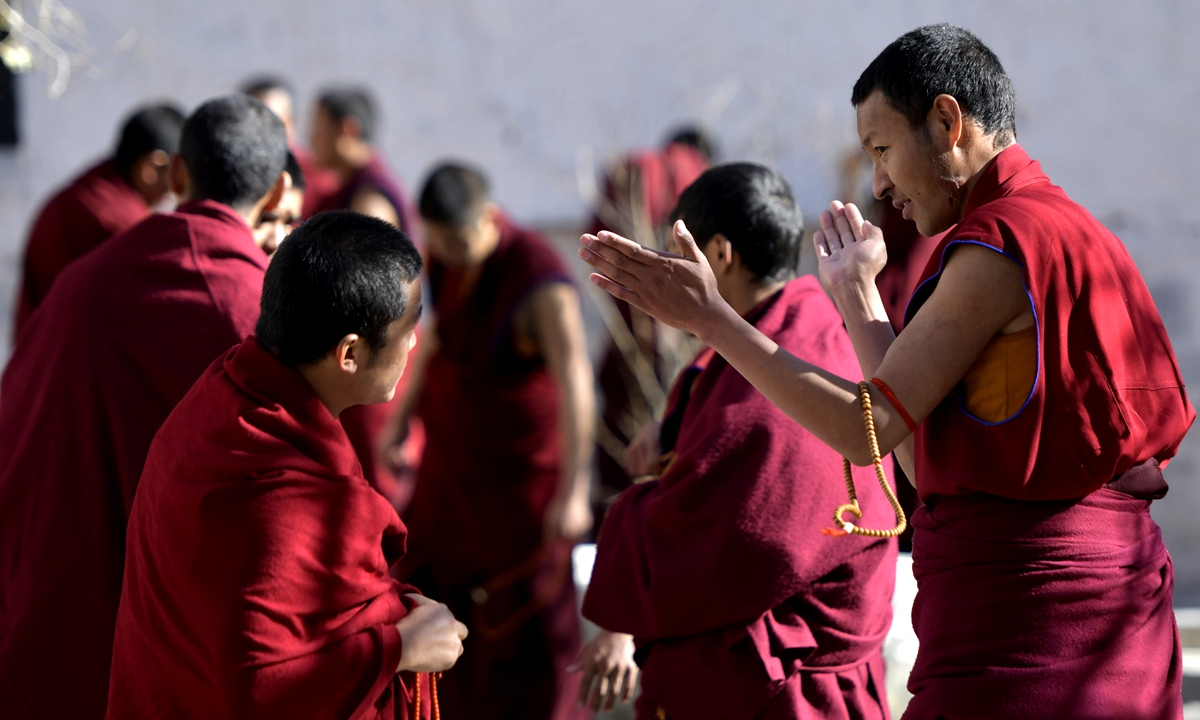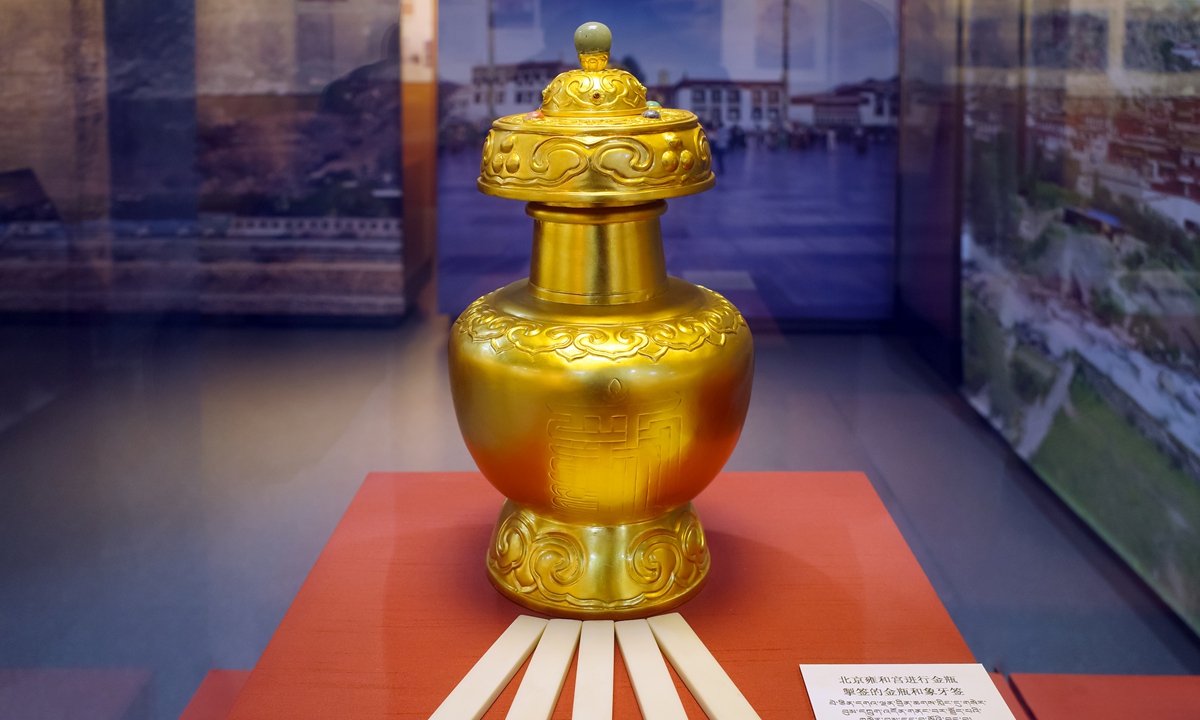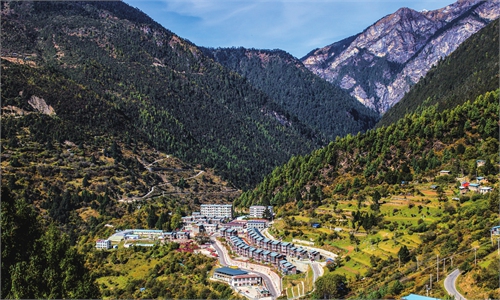Ignored legal facts
otala Palace in Lhasa, Xizang Autonomous Region Photo: VCGEditor's Note:
"Cognitive Warfare" has become a new form of confrontation between states, and a new security threat. With new technological means, issues are planted and disinformation spread so as to change people's perceptions and thus alter their self-identity. Launching cognitive warfare against China is an important means through which Western anti-China forces attack and discredit the country. Under the manipulation of the US-led West, the "China threat theory" has continued to foment.
Certain politicians and media outlets have publicly smeared China's image by propagating false claims in an attempt to incite and provoke anti-China reprisals among people in certain countries. These means all serve the evolution of the US' covert China containment strategy in a bid to maintain its hegemony.
The Global Times is publishing a series of articles to systematically reveal the intrigues of the US-led West's cognitive warfare targeting China, and expose its lies and vicious intentions, in an attempt to show international readers a true, multi-dimensional, and panoramic view of China.
Reincarnation system, a concept deeply rooted in Tibetan Buddhism, has long fascinated the Western world. However, this profound belief has often been misunderstood and misrepresented by some Western politicians and media outlets. Besides, the Western portrayal of reincarnation system in Tibetan Buddhism often fixates on the Dalai Lama and the concept of reincarnation was often misused for political motives in the West, further distorting the truth.
This is the sixth installment in the series. In this installment, we invite Yang Yongchun, a chief expert in the Tibetan legal practice from relevant government agency, who holds doctorates in both Buddhist Studies and Law, to delve into this concept and give detailed explanation as to why so many people in the West are misled.

Monks from the Tashilhunpo Monastery debate sutras in Xigaze, Xizang, on December 4, 2023. Photo: VCG
I have been engaged in legal practice on affairs related to the Xizang Autonomous Region for a long time, and have noticed a viewpoint held by many Westerns during negotiations and exchanges with Western political entity representatives at the international level. They believe that the Chinese government, at all levels, should not "dominate" or "interfere in" the reincarnation of important sect leaders in Tibetan Buddhism. Their reasoning is that this is a religious autonomous act based on religious doctrine and tradition.
Due to the complexity of Buddhist doctrines, linguistic barriers, unique Tibetan Buddhism rituals, and the general political inclination of the modern international society toward religious matters, this viewpoint has gained popularity in the West. This issue is related to whether the Chinese government's involvement in the reincarnation of Tibetan Buddhist sect leaders respects Buddhist doctrine and adheres to religious ethics. In simple terms, the viewpoint questions whether the secular laws of the worldly realm can be applied to the designated successors of Tibetan Buddhist sect leaders.
It is evident that the key to understanding this issue lies in understanding how religions approach reincarnation, as well as how the fundamental teachings of Tibetan Buddhism determine reincarnation and people who are reincarnated. Only by doing so can we determine whether the individuals recognized by the reincarnation system in the doctrines and rituals of Tibetan Buddhism are ordinary people in the secular world or mysterious entities that are difficult to substantiate legally. This determines the ethical foundation of Chinese legal regulation regarding the lineage of reincarnation in Tibetan Buddhism, which has lasted for over 680 years.

The Tibetan Culture Museum in Beijing exhibits a golden urn used in the reincarnation of living Buddhas, on January 25, 2023. Photo: VCG
Solid legal foundation
Looking at the various doctrines of Buddhism, the concept of reincarnation is described as a transformation of social status from the original South Asian caste society, to the expression of individuals' cultivation and realization of truth. There are no particularly mysterious records regarding this.
In Tibetan Buddhism, the inheritance of the Dharma lineage mainly takes the form of family lineage inheritance, master-disciple inheritance of precepts, and the inheritance of the position of temple abbot. The reincarnation inheritance is just one of the common inheritance methods. The Chinese central governments or local governments therefore regulate religious inheritance affairs based on the rule of law and public welfare. This is done in deference to Buddhist doctrines and in full compliance with religious ethics. It is also a management system based on Chinese law, and is not an intervention in any identity or matter with any mysterious implications. This is also the institutional purpose of Chinese laws concerning reincarnation inheritance.
Today, some rhetoric in the West claiming the so-called "Chinese government's intervention in the reincarnation inheritance of Tibetan Buddhism" is based on a fundamental assumption that the Chinese government has no basis or authority to intervene in the reincarnation inheritance of Tibetan Buddhism.
In fact, the Central Government of China's participation in the affairs of the reincarnation inheritance of Tibetan Buddhism, especially in the reincarnation of influential living Buddhas, is based on the "imperial commendation" of the Chinese Central Government.
There is no denying that the issue of the reincarnation of the Dalai Lama is of great concern to Western political entities. Their logic is that the Dalai Lama is the spiritual leader of various sects within Tibetan Buddhism, and after the passing of the previous leader, the religious community needs to decide on the future leader and what qualities they should possess. Western political entities view this as a matter of religious autonomy, similar to the process of selecting a Pope in the Catholic Church. However, this interpretation has led to many misunderstandings.
Due to the complexities of religious doctrine, multiple languages, historical knowledge, and legal interpretations, it is quite difficult to clarify these issues. In fact, the process of the reincarnation or succession of high-ranking living Buddhas in China is fundamentally different from the selection of a Pope in the Catholic Church.
As opposed to how the title of the Pope is indeed defined by the Catholic Church itself, the titles of the majority of high-ranking living Buddhas in Tibetan Buddhism are not similarly prescribed. This is because, aside from the Dalai Lama, most high-ranking living Buddhas of the reincarnation lineage use titles conferred by the Central Government of China. These titles are understood in traditional Chinese law as "imperial commendations," that is, "honorary titles" granted by the Central Government of China to the leaders of religious sects.
Second, imperial commendation must be legally recognized by the Central Government of China. Taking the title "Dalai Lama" as an example, before the Third Dalai Lama, the great living Buddhas of this reincarnation lineage were actually named after their Dharma names, namely the "Gendun" series of living Buddhas.
The Dharma name of the Third Gendun living Buddha, Sonam Gyatso, was given a hybrid title in Sanskrit, Mongolian, and Tibetan through his exchanges with Altan Khan, the Shunyi King of the Ming Dynasty (1368-1644) in present-day Qinghai, Northwest China. This title was not approved by the central government of China at that time, so the reincarnation lineage was still known by its Dharma name, which was the "Gyatso reincarnation lineage." The Fourth living Buddha in this lineage was Yonten Gyatso.
It was not until February 1653, when the Fifth Gyatso Lama (also referred to in official Chinese documents as "Fuhai Lama") was returning to Xizang after presenting himself before the emperor in Beijing and arriving in Taikha in today's North China's Inner Mongolia, that the central government of the Qing Dynasty (1644-1911), following the rituals of the Ming Dynasty, granted the Lama the imperial commendation in the Han language, the official language of the country, along with a golden book and seal in Han, Manchu, and Tibetan as symbols of the commendation.
Thereafter, the central government of China began to use the legal abbreviations "Dalai Lama" in official documents.
Clearly, before the Central Government of China granted the imperial commendation, the Gyatso reincarnation lineage of living Buddhas had never had the commendation of "Dalai Lama," nor the translated titles present in English today. References to the "Dalai Lama" in the legislation or legal documents of some countries are even more baseless.
The case of the Dalai Lama illustrates that the Chinese government possesses ownership of imperial commendation, and starting from the significance of the commendation as an object, it inevitably leads to the formation of rights and powers in terms of the "possession of the object" and "use of the object."
From a legal practice perspective, the ownership of imperial commendation has been held by the Central Government of China on behalf of the state at different times, and is granted to the inheritors of Tibetan Buddhism for use. Any reincarnation lineage that accepts the imperial commendation necessarily has the duty to maintain historical customs and stability. Historical central governments of China have maintained their legal involvement in the Tibetan Buddhist reincarnation tradition by relying on imperial commendation.
If Western political individuals examine the historical and legal facts of the successive Chinese central governments' lawful participation in the reincarnation traditions of Tibetan Buddhism in a truly responsible way, it is evident that "participation according to law and historical precedents" has been a consistent approach by the Chinese central governments. If, under the guise of human rights, one distorts or attacks the centuries-long legal and institutional facts of a country, they will not gain the understanding and respect of rational people who have good intentions for the world.









